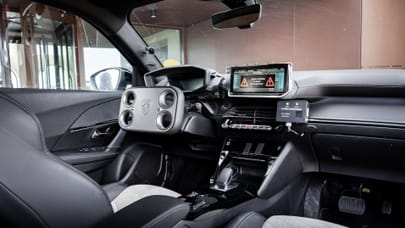
The man who made Fords great to drive has passed away
Richard Parry-Jones, who has died aged 69, leaves behind an astonishing legacy
Richard Parry-Jones, the engineer responsible more than any other for the driving excellence of 21st-century Fords, has died aged 69.
The news has sent shockwaves round an industry where his influence had spread hugely. And where he wasn't only admired but held in deep affection by everyone who knew him. He was killed in an accident on the farm in Wales where he'd retired.
Parry-Jones was a brilliant dynamics engineer, a superb communicator, a motorsports fan and an early advocate for the need for the car industry to reduce CO2. His working life is a demonstration of how one individual really can have an influence over this whole colossal industry.
The man known to all as RP-J was a Ford lifer, having joined as an apprentice. His first big hit was as chief engineer of the Mondeo, launched in 1992. This was a huge programme: Ford spent about £5bn (in 1995 money) on the Mondeo and its American equivalents the Ford Contour and Mercury Mystique.
Previous to that car, Ford's engineering effort – and it was very well executed - was all about saving money. If in consequence the car's ride was lumpy and the engine rough and the steering slack, well that was tough luck: they were profitable cars to manufacture and sell.
With the Mondeo, Parry-Jones shifted Ford's course. He reckoned there would be more money to be made by building better cars that would sell in higher numbers at higher prices. He sweated every detail of the engineering in search of improvements in dynamics and refinement.
You'd be driving with him and he'd say things like, 'see, we've changed the compliance in the steering rack bushes. The customer can feel it you know'. He was passionate, and a brilliant communicator.
It's a rather awful irony that within weeks of Ford's announcement that the Mondeo will be no more, we also lose the man that made it.
After that Mondeo, he led on the Fiesta, a vast improvement on what went before, and the lovely Puma coupe. Then the 1998 Focus, a radically designed and brilliant-driving hatch, night and day better than the Escort. All spawned wonderful hot versions too.
At that point he was promoted to Detroit to head all Ford's engineering and design worldwide. He admitted to being pretty shocked at some of the US metal he had to deal with. Even the dominant F-150 pickup.
Top Gear
Newsletter
Thank you for subscribing to our newsletter. Look out for your regular round-up of news, reviews and offers in your inbox.
Get all the latest news, reviews and exclusives, direct to your inbox.
He was also in charge of engineering for all the vehicles under the FoMoCo umbrella, including, at the time, Jaguar Land Rover, Volvo, Mazda, Lincoln and Aston Martin. He returned to the board of Aston recently.
In his day, he'd been a very competitive rally driver. But he wasn't just about cars going at maximum-hoon. (Though he was also about that; I among many others have had to ask him to stop a road car he was driving so I could get out and chunder.)
No, he mainly wanted his cars to be satisfying at ordinary speeds to ordinary drivers. The progression of the steering, the refinement of the ride, the brake feel at gentle stops. His cars just felt right, even to drivers who had no idea why.
He didn't just operate by instinct. One of his great contributions was to develop a series of metrics, input-output graphs that could be recorded by sensors attached to prototypes. These fed into a digital model of what a Ford should feel like. This was propagated throughout the company to be used by engineers in multiple different places and times.
He was also a brilliant developer of talent, mentoring a generation of engineers inside the Ford Group. Others who worked for him went on to do great things elsewhere. Prominently, Uli Eichhorn worked with him on the Focus, and was recruited by VW. He made sure his Mk5 Golf got Focus-like suspension, before moving on to Bentley before becoming chief engineer of the whole VW Group.
So although RPJ retired in 2007, his influence reverberates across Ford, and in companies such as JLR and Volvo that are no longer part of Ford, and in companies entirely beyond Ford.
Actually, it basically went through the whole industry because nearly every European mainstream company had to polish its dynamics game to have a hope of keeping up with his late-90s cars.
He also pushed Ford's motorsport involvement, and brought in Malcolm Wilson to make the WRC team a success at the turn of the century.
After he retired, he served on several important industry boards, and advised the UK and Welsh Governments on auto, energy and industrial policy. He was chair of Network Rail for three years, too.
In all of this, he was a strikingly insightful thinker and wonderfully expressive communicator, as well as stimulating company who'd always give you a new way of looking at something. And a witty bon viveur. He once called for a final round of drinks at an off-site event, to be told by the waiter, 'sorry sir, we're now serving breakfast'.
He will be greatly missed by so many in his beloved Wales and far beyond. To his family and friends we send our best wishes.
Trending this week
- Car Review
BMW 1 Series








